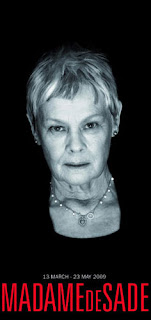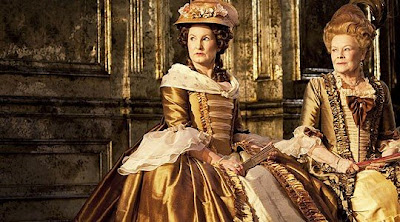 Sometimes a theatre production can have everything going for it: the cast are on message and off the book, the pacing is fine, the production design gets you into the world of the characters and the ambient elements help conjure a mood.
Sometimes a theatre production can have everything going for it: the cast are on message and off the book, the pacing is fine, the production design gets you into the world of the characters and the ambient elements help conjure a mood.All well and good. But sometimes all this can be used by a director to cover up the inadequacies of a text and then sadly all the good work can be seen clearly to be sumptuous wrapping paper for a gift you not only had once but have sold already on eBay.
Such is the case with the third of the Donmar's season at the Wyndhams, Yukio Mishima's MADAME DE SADE. While not the train wreck that some of the reviews would have you believe, Michael Grandage's production is a good example that you can't make a silk purse out of sow's ear - no matter how much material your designer has to hand.
The play concerns five women whose lives are directly affected by the notorious Marquise de Sade - his wife and her sister, her mother, a childhood friend and a notorious courtesan. While these women's lives are thrown into conflict by his actions, a maid moves silently through the room, her time fast approaching to have her own voice heard.
 Okay I'll get the worst over with now. As my Japanese isn't quite up to speed, it is hard to know if I should place the blame at Mishima's door or the absurdly wordy translation by Donald Keene - so I'll split it between them. Mishima wrote his play in the style of Racine who's formalist structure no doubt appealed to his grounding in the ritualistic Japanese theatre but when Racine's tortured heroines give vent to their desires in speeches it is with a passion that breaks through the formalism and keeps you hooked on their dilemma.
Okay I'll get the worst over with now. As my Japanese isn't quite up to speed, it is hard to know if I should place the blame at Mishima's door or the absurdly wordy translation by Donald Keene - so I'll split it between them. Mishima wrote his play in the style of Racine who's formalist structure no doubt appealed to his grounding in the ritualistic Japanese theatre but when Racine's tortured heroines give vent to their desires in speeches it is with a passion that breaks through the formalism and keeps you hooked on their dilemma. But in Keene's unrelentingly verbose translation, de Sade's women talk, and speechify, and make statements about offstage exploits. None of the women change because of these speeches, it's almost as if the characters aren't interacting - just speaking out to the audience. It would help if the endless yap actually kept the plot going but I was constantly confused about where the elusive de Sade was at any given time.
 It would be ok if the speeches were worth listening to... but the words keep coming, again and again and it is up to the individual actresses to give them the light and shade that the text denies them. Sadly the other problem I have with the production is that the astonishingly average Rosamund Pike is playing the pivotal role of Madame de Sade.
It would be ok if the speeches were worth listening to... but the words keep coming, again and again and it is up to the individual actresses to give them the light and shade that the text denies them. Sadly the other problem I have with the production is that the astonishingly average Rosamund Pike is playing the pivotal role of Madame de Sade. She has the most of the speeches but with the least vocal ability of any of the actresses. Throughout the play she has speech after speech on why she refuses to leave her dissolute husband which are delivered in a stately monotone. At the - um - climax of the play, Madame de Sade announces that she is entering a convent rather than see her husband now he is released from prison. Her final speech - which is surely what the whole play has been leading to - is delivered in the same monotone only with the volume turned up LOUD. To think in about ten years she will be giving us her Cleopatra, her Mrs. Alving... what a scary thought.
 So an annoying lead(en) performance and a dreary translation. But this was like an awful cake with fantastic thick tasty icing so let's start picking! First off, Grandage's production was an hour and 45 with no interval so luckily moved at a steady pace. Christopher Oram's sumptuous set conjours up Madame de Montreuil's salon, a glittering room of gilt and mirrors. As the text gives little to move the viewer, you are helped immensely by Neil Austin's subtle shifting lighting cues, Adam Cork's unsettling soundscapes and Lorna Heavey's flickering video images on the salon's walls. Oram's extravagant costumes adds to the visual splendour.
So an annoying lead(en) performance and a dreary translation. But this was like an awful cake with fantastic thick tasty icing so let's start picking! First off, Grandage's production was an hour and 45 with no interval so luckily moved at a steady pace. Christopher Oram's sumptuous set conjours up Madame de Montreuil's salon, a glittering room of gilt and mirrors. As the text gives little to move the viewer, you are helped immensely by Neil Austin's subtle shifting lighting cues, Adam Cork's unsettling soundscapes and Lorna Heavey's flickering video images on the salon's walls. Oram's extravagant costumes adds to the visual splendour. Apart from the unbending Pike, the other five actresses in the cast grasp their moments and give performances that shine amid the opulent surroundings.
Apart from the unbending Pike, the other five actresses in the cast grasp their moments and give performances that shine amid the opulent surroundings.Judi Dench is to be applauded for adding her box-office appeal to such a non-west end play and makes bricks from the Mishima hay as Madame de Montreuil is given little to do but sweep around the stage in various shades of outraged morality and motherly anguish. That she transcends this to suggest a woman whose moral certainty is slowly eroded is to her credit. The audience - no doubt Denchites to the end - seized any chance to laugh at her every cutting, exasperated, withering remark. The fact that she hadn't said anything remotely funny obviously never crossed their minds.
 Fiona Button has a nice teasing quality which she utilises to good effect as Madame de Sade's younger sister Anne who is more than happy to be deflowered by her brother-in-law. Deborah Findlay - one of my favourite actresses - plays the devout Baronesse de Semiane, once a childhood friend of de Sade, who refuses to believe the excesses of her former playmate and who of course ends up as a nun!
Fiona Button has a nice teasing quality which she utilises to good effect as Madame de Sade's younger sister Anne who is more than happy to be deflowered by her brother-in-law. Deborah Findlay - one of my favourite actresses - plays the devout Baronesse de Semiane, once a childhood friend of de Sade, who refuses to believe the excesses of her former playmate and who of course ends up as a nun! Jenny Galloway turns in another notable supporting performance
Jenny Galloway turns in another notable supporting performance  as Charlotte, the seemingly docile attentive maid who, at the end of the play, has become a scowling member of the now-dominant sans-coulottes, bristling with class hatred in a nice scene where she fronts it out with Dench.
as Charlotte, the seemingly docile attentive maid who, at the end of the play, has become a scowling member of the now-dominant sans-coulottes, bristling with class hatred in a nice scene where she fronts it out with Dench.And finally there is the delicious, delirious Frances Barber as a notorious aristocractic nympho. I suspect the audience were with me in hoping that every time the large doors of the salon were opened that she would again sweep on and give the play the much-needed kick in the arse it needed.
Actually make that a whip across the arse as the opening scene - which raises expectations of a good play - involves Barber's Comtesse de Saint-Fond lasciviously describing to Findley's shocked but curious Baronesse exactly what de Sade got up to with a couple of whores and his valet in a hotel room in Marseilles, all punctuated with cracks from her riding crop against her volumous train.
 Her second appearance (in a towering wig) gives her another lipsmacking speech about being used as an altar during a black mass which is pure purple prose but is made bearable by her purring, husky, sandpaper-in-velvet delivery. To paraphrase Groucho Marx, her scene-stealing is the biggest robbery since Brinks - but thank God she's there!
Her second appearance (in a towering wig) gives her another lipsmacking speech about being used as an altar during a black mass which is pure purple prose but is made bearable by her purring, husky, sandpaper-in-velvet delivery. To paraphrase Groucho Marx, her scene-stealing is the biggest robbery since Brinks - but thank God she's there!Most of the time I sat there imagining I was actually watching a revival of Christopher Hampton's majestic LES LIAISONS DANGEREUSES with Frances Barber as the Marquise de Merteuil, Judi Danch as Madame de Rosemonde, Deborah Findley as Madame de Volanges and Fiona Button as Cecile. Ah well... I can dream.
No comments:
Post a Comment